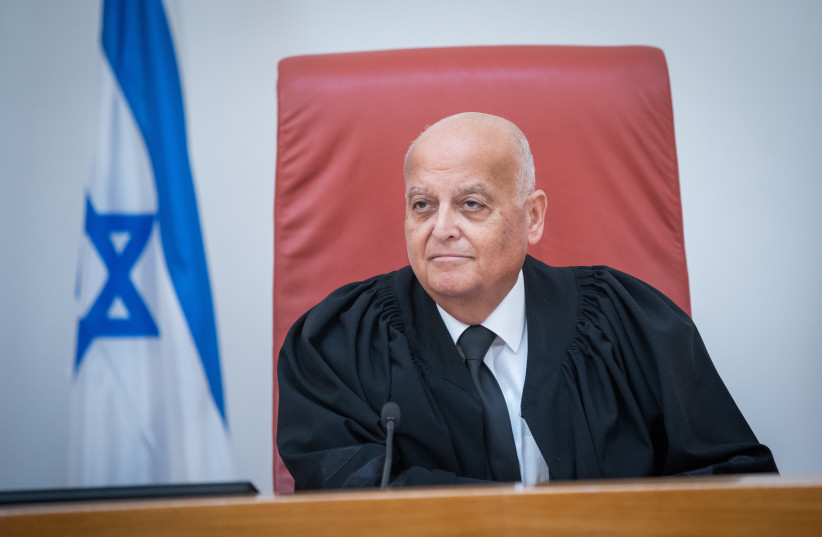On Sunday evening, 109 judges – an unprecedented number – were appointed to district, magistrate’s, and traffic courts across the country, with some of the appointees to the magistrate’s courts assigned to family and juvenile courts or as senior registrars and executors of court orders.
In a ceremony lasting almost two hours, held on the grounds of the President’s Residence, the new judges, clad in their black robes, repeated the traditional pledge based on the 18th verse of the 16th chapter of the Book of Deuteronomy: “I pledge allegiance to the State of Israel and its laws to judge fairly, without fear or favor, to refrain from bias in trial, and to refrain from discrimination.”
According to tradition, the judge then signs the pledge and is given his or her appointment by a triumvirate comprising the president of the State of Israel, the president of the Supreme Court, and the justice minister.
Clouding the excitement of the occasion was that the Supreme Court has been without a president for more than half a year because Justice Minister Yariv Levin aims to abolish the traditional seniority system of appointing a president. If tradition is upheld, the next president will be Yitzhak Amit, of whom Levin disapproves.
Levin prefers to appoint Yosef Elron, who has served on the Supreme Court since 2017. Levin, who heads the Judicial Selection Committee, has prevented it from voting on the presidential issue, fearing it would maintain tradition. This also means that two additional vacancies on the Supreme Court have yet to be filled.

Levin is due to appear before the High Court of Justice next week to explain his decision.
Attorney-General speaks out
The hearing was preempted on Sunday evening by Attorney-General Gali Baharav Miara, who, while Levin was attending the ceremony at the President’s Residence, published a response to his forthcoming appeal to the High Court. The failure to appoint a president of the Supreme Court for such a long period is unprecedented, she wrote, adding that the delay has caused severe harm to the judiciary and the separation of powers.
Baharav Miara has refused to represent Levin in court. Zion Amir, a private attorney who has represented many public figures in the past, including former Israeli president Moshe Katsav, will represent the justice minister.
MEANWHILE, UZI Vogelman, the acting president of the Supreme Court, stood on stage alongside President Isaac Herzog and Levin on Sunday.
Herzog, in his remarks, referenced the Supreme Court fiasco, recalling that in April, when a much smaller ceremony was held following a two-year hiatus, he congratulated Levin and Vogelman on reaching an agreement. He said he would be glad to do so again, but all concerned must make an effort to find the golden mean and fill all vacant places in the courts.
He emphasized the need to judge fairly in these challenging times, while Israel is embroiled in war and trying to bring home the 120 hostages still in captivity in Gaza.
Herzog also offered a prayer for the safety of all the soldiers fighting to defend Israel, as well as the return of the hostages. Among the hundreds of people present were former hostage Yocheved Lifshitz, and Shai and Dalit Testa, the parents of 19-year-old 1st Sergeant Ido Testa, who fell in battle in Gaza in May. Their presence was particularly meaningful on this occasion, as Shai Testa works in the Justice Ministry and Dalit Testa works in the administrative section of the courts.
Vogelman and Levin also referred to the soldiers and the hostages, each offering prayers for their safe return to their families.
Vogelman said that the new appointments help strengthen the judiciary. He was pleased to see that the new appointees represent different sectors of the population (including minorities), a factor that he said was very important.
Although the burden of their work would be very heavy, all the judges must give their full attention to each case and remember that their responsibility is to uphold the law and the rights of each individual, he said.
Vogelman expressed pride in the accomplishments made during the nation’s challenging times but emphasized that the work remains incomplete. That point was also made by Levin, who acknowledged the need to make appointments to the Supreme Court.
Before referring to the appointments at hand, he attempted to express his condolences to the Testas, but with his voice breaking, he admitted that adequate words had failed him.
As for reaching an agreement on the 109 appointments, Levin said he was convinced that, in a time of war, a broad consensus was essential to making decisions. “The results are above and beyond any past endeavors to appoint judges,” he said.
Levin noted that in the space of half a year, 162 judges were appointed, whereas in the past, appointing nearly that number had taken a full year. He said he was confident that, with openness and understanding, more judges would be appointed in coming months. “We have work to complete, including Supreme Court appointments,” he said, expressing hope that the attitude that prevailed to date would continue and result in the best choices possible.
Being a judge is not an easy job, he conceded, “but it is a great privilege and source of pride to serve the State of Israel in this manner.”
